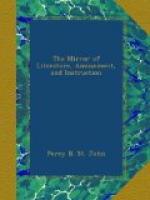And them within her passive part receives,
Which are enlightened by that part which acts,
And so the form of single things receives;
But after by discoursing to and fro,
Anticipating and comparing things,
She doth all universal natures know
And all effects into their causes bring.
Our wit is given Almighty God to know,
Our will is given to love him being known,
But God could not be known to us below
But by his works, which through the sense are known.
DAVIS.
* * * * *
THE SELECTOR; AND LITERARY NOTICES OF NEW WORKS.
* * * * *
HISTORY OF THE REFORMATION IN ENGLAND.
Effects of the Dissolution.
The progress of the Reformation was attended (as all great national convulsions are) with many and sad excesses. The work of destruction, when long continued, is in itself a thing which hardens the heart; and the Reformation was full of it. Monk and nun turned out of house and home, pensioned indeed, but (except in the case of superiors, who were treated with more lenity) pensioned with a miserable equivalent; their dwelling-places, beautiful as many of them were, laid low, that all hope of return might be cut off; their cells surrendered to the bats and owls; their chapels made a portion for foxes, the mosaic pavements torn up, the painted windows dashed in pieces, the bells gambled for, or sold into Russia and other countries,[4] though often before they reached their destination buried in the ocean—all and utterly dismantled, save where, happening to be parish churches also, as was the case at St. Alban’s, Tewkesbury, Malvern, and elsewhere, they were rescued in whole, or in part, from Henry’s harpies, by the petitions or the pecuniary contributions of the pious inhabitants;[5] libraries, of which most monasteries contained one, treated by their new possessors with barbaric contempt; “some books reserved for their jakes, some to scour their candlesticks, some to rub their boots, some sold to the grocers and soap-boilers, and some sent over sea to book-binders, not in small numbers, but at times whole shipsful, to the wondering of foreign nations; a single merchant purchasing at forty shillings a piece two noble libraries to be used as grey-paper, and such as having already sufficed for ten years were abundantly enough (says the eye-witness whose words are here quoted) for many years more;"[6] these were some of the coarser features of those times; howbeit there were many besides these. For the churches were now treated with gross irreverence; horses and mules were led through them; they were profaned by dogs and hawks, by doves and owls, by stares and choughs;[7] they were plundered of their plate by churchwardens, or other powerful parishioners,[8] who might argue, that if they spared, others would spoil;




